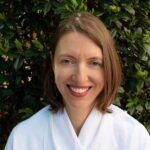 Associate Director of the UNC Institute for the Study of the Americas
Associate Director of the UNC Institute for the Study of the Americas
Hannah Gill is the Program Director for the Latino Migrant Project. She is an anthropologist and oral historian with a specialization in Latin American/Caribbean migration studies. She is the author of the book, “The Latino Migration Experience in North Carolina: New Roots in the Old North State.” Hannah is also associate director of the Institute for the Study of the Americas at UNC-Chapel Hill. She received a DPhil in Social Anthropology from the University of Oxford, England. She is a native of North Carolina and an alumna of UNC-Chapel Hill.
How did you start doing participatory research?
Dr. Gill’s inspiration to pursue participatory research began with her dissertation fieldwork on transnational migration from the Dominican Republic to the northeastern U.S. She remembers wondering as she studied, “Am I getting this right? Am I on the right track?” With funding from the American embassy, nine months into her fieldwork she was able to solicit this feedback from the community members she was working with for her research. Dr. Gill organized a series of community meetings and a forum at a local museum to present her findings in accessible language and listen to the community’s responses. Although the dissertation didn’t begin with the same community-based approach that her current work employs, the generative experience of sharing its results served as a formative starting point for her career in participatory research.
What are your current participatory projects?
Through her work at the UNC Institute for the Study of the Americas, Dr. Gill directs the Building Integrated Communities (BIC) program. This is a community planning and leadership initiative that partners with North Carolina local governments to implement policies and practices that are inclusive for residents who are born in foreign countries. With the guidance of impacted communities, Dr. Gill and her team have developed plans for leadership and entrepreneurship opportunities, communication infrastructure, and public safety improvements – issues that cities have purview over.
Recently, Dr. Gill worked with a group of thirteen local community leaders of the City of Sanford’s Equity Task Force to define research priorities and areas of concern for communities of color. BIC facilitated a study that demonstrated racial and ethnic disparities in income, retention, and promotion of city employees. Dr. Gill and BIC team members collaborated with community members to develop and present to City Council more than forty recommended actions. Dr. Gill has also worked with the town of Chapel Hill through the BIC initiative to develop a comprehensive language access plan. These inclusive and streamlined communications proved especially critical at the onset of the COVID-19 pandemic when the local government was disseminating time-sensitive information and resources.
What does participatory research mean to you?
For Dr. Gill, participatory research is an academic pursuit developed in tandem with and according to the priorities of the people who are being researched. These community members are involved in each step of the research process, from start to finish. Recognizing that the process looks different depending on the researcher’s positionality and relationship to the community, Dr. Gill considers a commitment to participatory methods as particularly important for scholars who are working in communities that are not their own. She highlights building trust and strong relationships as central to successful participatory projects.

“(Participatory research) is a safeguard as well to our research process. We’re at risk if we spend a year doing a lot of research and then give recommendations to city leaders and they’re like, ‘Oh well, we don’t want to do that.’ …Ultimately, we just want change to happen. We don’t want to be doing research that goes nowhere. We want the research to create systemic programmatic and policy changes that help people’s lives.”
“It’s not just helping the community. It is also a strategic move for a researcher that wants … the research to go somewhere beyond academia. The work we do needs to have real world impact. It needs to go beyond just scholarly academic journals.”